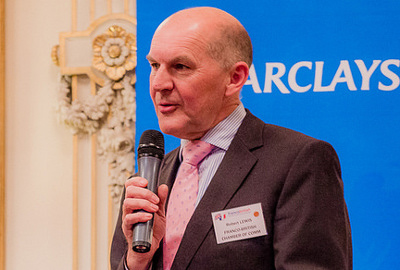The period since the terrible events of November 13th has been a difficult one for us all. Everybody knows somebody in Paris, and the digitally connected era we live in makes that person or persons seem closer than ever, and the tragedy all the more real.
Like many of you, in the hours and days that followed, I received not just messages of sympathy but genuine outpourings of concern, sometimes from quite surprising people and places.
Having spent most of my career with one foot on either side of the Channel, the economic fortunes of the UK and France have always seemed intertwined, perhaps artificially at times. When you are in charge of sales across a whole region, then how the UK and France are performing is part of the same train of thought.
What struck me though in many of the sympathy messages I received, was just how many people reached out to me who do not have any direct business link to France. They are simply people from outside of France who were concerned by events. Their day-to-day work does not put the UK and France, or the USA and France in the same thought process, and it is to those people to whom I appeal for support.
When I was interviewed by BBC radio last week about how business life in Paris was managing to carry on despite the terrible events, the focus was very much on what the reality was for those of us working here.
READ ALSO: Paris finally draws breath after the attacks

Bob Lewis
I read in the Wall Street Journal yesterday that economic indicators are beginning to show signs of a slowdown in activity in France. This particular downturn should not be confused with the global slowdown we are experiencing which is mostly due to falling oil prices, low demand in China and India, as well as signs of weakening consumer demand in the US and the UK.
We should be mindful that perhaps those are stronger reasons for any current slowdown we are seeing rather than the knee jerk reaction of currency and stock markets. Tourism and travel represent 10 percent of GDP in France but the effects of these events will not be seen in P&L for months to come.
Taking this into account, it made me think about what we can all do to ensure that the economic impact of recent events is limited. For those of us living and working in Paris, it is going to be business as usual in the weeks and months to come. “Getting on with things” is part of the coping mechanism that will help us through this.
I’d also like to appeal to those people who do not have direct ties to France, to those people whose remit doesn’t include their French business, to express their solidarity with us by not forgetting that it is in the weeks and months to come that France will need support.
Don’t put off that business trip or cancel that meeting. Do hold that seminar you had planned. Take that plane ticket with a layover at CDG. Keep thinking about business opportunities in France.
If you are thinking about business people you know here, then also think about how you might be able to talk about business opportunities with them next time you make contact. We’re doing business here still, so help us by thinking about how you could be too.
Keep coming to visit. Come for weekends. Don’t delay booking your holidays or mini breaks. Tell those close to you that France is still open for business and for pleasure.
The spirit of togetherness which people of both countries have shown in recent days has demonstrated that the people of the UK and France have a bond which runs very deep. Let’s all make sure that we see the positive side of this, and channel the recognition of a common purpose into something constructive. With your help, we can ensure that France will get through this stronger than ever.
We’ll never forget what happened, but we will always remember how “solidarité” got us through.
Bob Lewis is the President of the Franco-British Chamber of Commerce and Industry, the voice of Franco-British business in France. For more information on the FBCCI you can visit its website www.francobritishchamber.com



 Please whitelist us to continue reading.
Please whitelist us to continue reading.